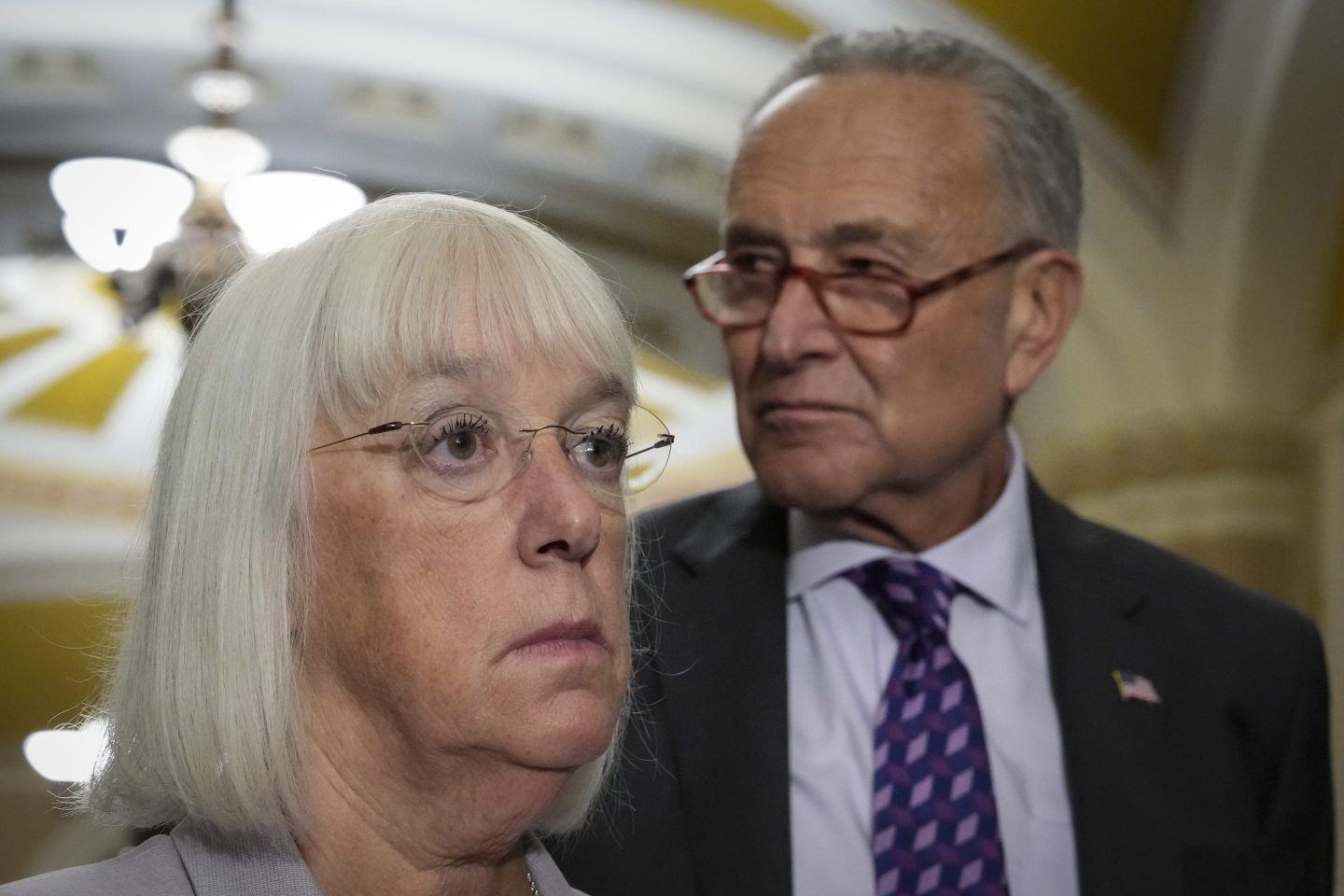President Donald Trump’s hardball tactic of ordering permanent layoffs Friday amid a government shutdown hardened Democrats’ deep distrust of Republicans and risks prolonging a standoff that is already the fourth longest in US history with no end in sight.
Senator Patty Murray, a senior Democrat, slammed the firings announced by Trump budget chief Russell Vought as illegal and “nothing new” from an administration that has ignored spending laws since Trump returned to power in January.
“No one should be intimidated by these crooks,” she fumed on Friday. “The way we reopen government is compromise, a simple concept every American understands — and no amount of threats will change that.”
The shutdown is the most acute symptom of a general lack of goodwill on Capitol Hill, where bipartisan deal-making has increasingly gone out of vogue. Since Trump returned to office in January, he has steamrolled Democrats and their priorities via executive actions including ordering mass layoffs and slashing billions in spending.
The GOP Congress has mostly ignored Democrats too, passing a massive partisan spending and tax bill and refusing to sit down with Democratic leaders on funding the government until a day before the deadline.
Democrats see the funding fight as their first real moment of leverage. And they’ve made health care costs, a pocketbook issue they’re counting on to resonate with voters ahead of next year’s midterm elections, their focus.
“They just cannot fathom having to deal with us,” said Senator Brian Schatz of Hawaii, a member of the Democratic leadership who has previously struck deals with Republicans. “It’s making them angry. But this is not about how we all feel. This is about premiums doubling for 24 million people.”
Republicans have dismissed Democrats’ efforts as nothing more than political opportunism, arguing their real concern is satisfying a liberal base eager to take on Trump.
“The whole trust thing is just an excuse for them for bad behavior,” said Markwayne Mullin, an Oklahoma Republican senator who talks frequently with Trump. Mullin said Trump wants to make a deal on health care, “but we’re not negotiating on reopening the government.”
But Democrats say they simply don’t believe congressional Republican leaders, Trump and especially Vought will deliver a health care fix unless forced to do so. Already this year, Trump and Vought have slashed tens of billions in spending on Democratic priorities despite Minority Leader Chuck Schumer and other Senate Democrats providing the votes to keep the government open in March.
“Now they’re like ‘trust us again,’” said Democratic Senator Ruben Gallego of Arizona. “I’m sorry, I’m not going to trust Lucy again when I’m trying to kick the football,’” he said in a reference to the popular Peanuts meme.
Senate Democrats say they won’t drop their filibuster blocking a reopening of the government for a mere promise of future talks. They want upfront negotiations on their demands — including an extension of Affordable Care Act premium subsidies that expire in January.
“The challenge is when senior White House advisers are calling our party a terrorist organization, it’s safe to operate under the assumption that they’re not operating with a desire to make a deal,” Schatz said.
The Senate has already failed to overcome a Democratic filibuster seven times, and they’ll try again when senators return to Washington on Tuesday.
Speaker Mike Johnson’s decision to send the House home indefinitely — intended to pressure Democrats to cave — only incensed Democrats further, particularly as federal civilians go without pay and military members risk missing their Oct. 15 pay date.
Trump on Saturday said his administration has found funding to deliver paychecks to US troops on Oct. 15 despite the shutdown, although it wasn’t immediately clear whether there was sufficient money to pay all troops or whether he has the legal authority to deliver paychecks.
On Friday, Vought posted a single line to his X account: “The RIFs have begun.” He was referring to reductions in force, a way of describing layoffs.
Some moderates including Republicans Susan Collins of Maine, Lisa Murkowski of Alaska and Democrat Jeanne Shaheen of New Hampshire have been trying — so far unsuccessfully — to negotiate an end to the standoff and unlock a broader deal on health care and the federal budget.
Wary Democrats say they’ve been burned before.
A similar negotiation ended a brief shutdown in a fight over immigration policy in early 2018, only for Trump to torpedo a bipartisan deal weeks later.
That experience, and assorted other issues, have resulted in broken trust, said Senator Chris Coons of Delaware. “It is so corrosive,” he added.
Also corrosive — the contradicting and quick-changing statements. Trump briefly had Democrats abuzz when he said Monday that the administration was talking to them and that he wanted to reach a deal on health care — only to clarify later Democrats must reopen government first. Assorted administration announcements of stalled projects in Democratic states and threats to not pay federal workers also had Democrats digging in rather than caving.
Capitol hallways have become an endless series of partisan scrums and press conferences where the two sides play the blame game, occasionally to each others’ faces on camera in impromptu scuffles.
Republican leaders like Johnson and Senate Majority Leader John Thune warn programs that help poor women and their children are running out of money and that critical government functions are at risk because of the Democratic filibuster. Democrats say they’re imperiled because Republicans and Trump would rather keep the government shut than protect health care for millions.
Schumer has touted polls showing more voters blame Republicans and Trump, and strong public support for extending health care subsidies. Most recipients are actually in states won by Trump, with millions of them getting notices now showing they face steep increases in their monthly premiums — in some cases thousands of dollars a month.
Beyond their immediate health care demands, Democrats have other reasons to be wary of any Republican assurances. They have asked repeatedly why they should vote for a spending bill that was negotiated without them and that the Trump administration won’t commit to implementing. Trump and Vought claim sweeping powers to cut spending without Congress, despite laws to the contrary.
If past shutdowns are a guide, Democrats will eventually cave. But they’ve elevated the health care issue, which they plan to run on in next year’s midterm elections, and have exposed divides among Republicans, notably when Representative Marjorie Taylor Greene broke with her party’s leaders and demanded a health care fix.
Meanwhile, some Republicans, including Greene, have started to broach going “nuclear” on the Senate’s 60-vote rule to allow them to bypass Democrats to reopen government. Republicans changed the rules to speed Trump’s nominations a few weeks ago, but doing so on legislation would have profound implications for US politics, with many worried such a move could boomerang on the GOP.
Johnson raised concerns that nuking the filibuster could one day empower socialists, in an appearance on C-SPAN Thursday. Nonetheless, he said the idea is being discussed.
“This government shutdown thing has gotten way out of control,” he said.












